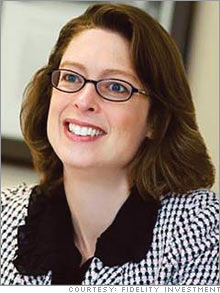NEW YORK (Fortune) -- The Yankee way of facing setbacks, as any Boston Brahmin knows, is to stiffen the upper lip and suffer in silence. As three of Fidelity Investments' key executives quit in rapid succession this year - mutual funds boss Steve Jonas in January, COO Bob Reynolds in April, and Ellyn McColgan, the head of operations and distribution, in August - the company's billionaire owner and CEO, Ned Johnson, has played to type. He has not gone out of his way to discuss the upheaval with worried employees. He hasn't admitted any problems in the press, which he has long shunned. Nor has he addressed another personnel matter, not even to Fidelity's senior brass: the health of his daughter, Abby, who runs the multibillion-dollar 401(k) and employer services division.
The medical condition of Abby, 45, the oldest of Ned's three children, would not be Fortune's business except that with the recent talent drain, Abby is now the last known candidate standing to succeed her 77-year-old father in running Fidelity, the $12.9 billion investment giant that is custodian to $3 trillion of other people's money. Johnson's refusal to discuss Fidelity is part management style and also a perk that comes with running a privately held company. But it may be clouding the firm's future.
 |
| Abby Johnson, head of Fidelity's 401(k) and employer services division and possible heir apparent |
Fidelity won't comment on Abby's health. But over the past year, say several executives who have worked with her, she has appeared to have undergone medical treatment and lost her hair - as well as weight from her already slim frame. Today she no longer wears a wig; her hair has grown back, and she looks healthy. In keeping with her stoic reputation, she has rarely missed work. But since she has not uttered a word about her health, not even to senior colleagues, no one knows if there even was an illness. Asked whether Abby has or has had cancer or another serious medical condition, Fidelity spokesperson Anne Crowley said, "We don't comment on employees' personal business out of respect for their privacy. You ought not construe anything from that." Ned and Abby Johnson declined to comment.
No one knows what to construe from Ned's recent moves or what role Abby's health may have played in them - in particular, his decision in July to bring in a new president, 60-year-old Fidelity alum Rodger Lawson. Lawson's hiring was seen as a direct slight to McColgan, the operations ace who, in the wake of Reynolds's exit, was promoted and viewed by Fidelity watchers as the most qualified candidate to succeed Johnson. McColgan was surprised by Lawson's appointment - and by the fact that she would be reporting to him instead of Johnson. She stuck around a few weeks until her new boss arrived. One day later she quit.
Fidelity's talent exodus, meanwhile, continues. Abby's division has lost several key executives. In July, Jeff Carney, president of Fidelity Retirement Services, jumped to Bank of America, while EVP Michael Sternklar went to Mercer Human Resources Consulting. Star 401(k) salesman Bill McDermott is also leaving. "We're talking to people who we could never get out of Fidelity," says one recruiter who likes to poach from the company. "Now they're desperate to get out because there's no end in sight to the inconsistency of leadership."
The mystery about Fidelity's future is also hurting its ability to lure talent. Says one candidate called by Fidelity's wholly-owned search firm, J. Robert Scott, about a chief administrative officer job: "Why would I go there, not knowing who's in charge?"
Finding the right leadership for the flagship fund business is critical. Ned, who 50 years ago started as an analyst at the company his father founded, has been overseeing the unit since Reynolds quit. Long troubled, the fund business was run by Abby for four years until 2005, when Ned shifted her to her current role - a move that was generally seen as a step down. Fidelity is still No. 1 in fund assets, but Vanguard and American Funds have gained share.
Fidelity's Crowley says Johnson and Lawson are recruiting as they assess all the businesses. But the buzz from Boston to New York is that Fidelity has recently made overtures to various prospects (including Eric Schwartz, the recently departed co-head of Goldman Sachs's investment-management division) and is having trouble because of its murky leadership outlook. Via e-mail, Lawson said, "Fidelity has traditionally viewed change as a normal and healthy part of business," and the recent changes "have been made with a clear intent to improve growth rates."
So what is Fidelity's future? When Lawson decided to return, he is said to have told people that one of his tasks was, in so many words, "to groom and guide Abby and Ellyn." With McColgan gone, his job is now half that. Lawson is seen as a transitional leader at best; he's too old and lacks the broad experience to fill Johnson's CEO shoes. The choice will likely come down to an outsider or Abby. She has doubters. But two things to keep in mind: She's still there. And she's still Ned's daughter. 